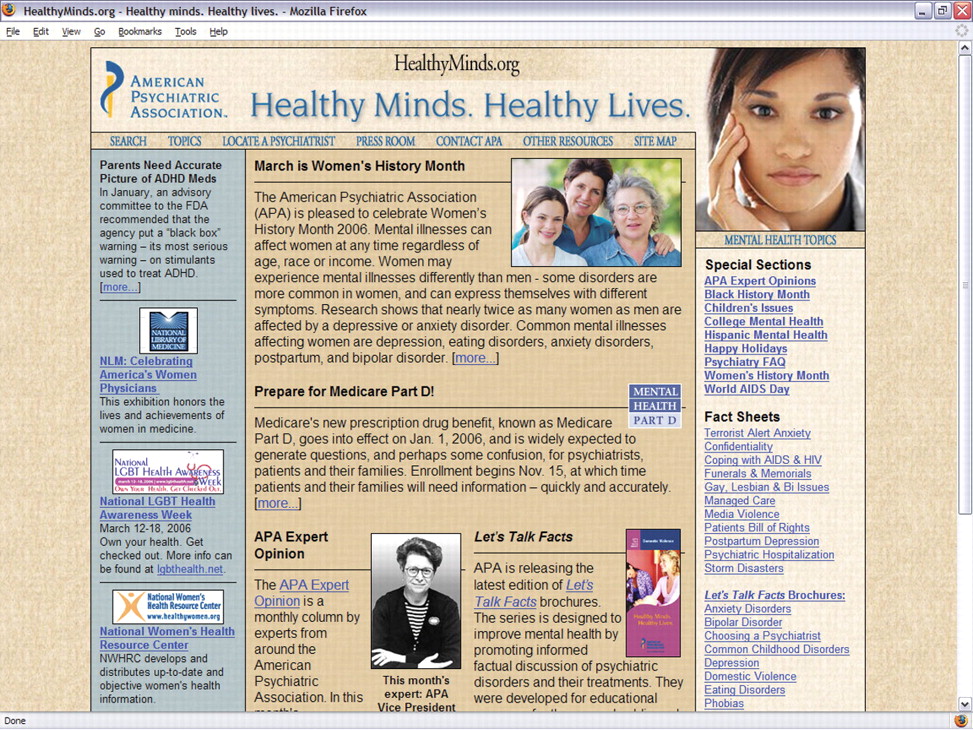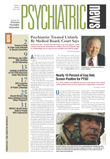Public opinion on mental health and psychiatry is driving the message behind APA's 2006 “Healthy Minds, Healthy Lives” campaign, which will make its debut in time for Mental Health Month in May. The campaign includes outreach to members of racial and ethnic minorities and nationally broadcast interviews with psychiatrists.
APA will launch this year's campaign on April 25 with a media satellite tour in which several well-known APA members and a mental health consumer will grant live interviews with the media on a variety of mental health topics. The interviews will be broadcast nationally on radio and television.
In addition, a special health insert will run on that day in the Washington Post featuring essays by APA President Steven Sharfstein, M.D., who will debunk some of the myths associated with psychiatry and reinforce the importance of seeking treatment for mental illness; National Institute on Drug Abuse Director Nora Volkow, M.D., who will write about treating drug addiction; and APA's Office of Minority and National Affairs Director Annelle Primm, M.D., M.P.H., who will address mental health disparities among ethnic and minority populations and the importance of understanding race and culture in the context of treating minority patients.
Other topics to be addressed in the Washington Post insert will include disaster psychiatry, depression and the workplace, and postpartum depression. The insert will be limited to editions distributed within the Washington, D.C., metro region.
APA's Healthy Minds Web site will also reflect the messages behind APA's 2006 campaign, which will be determined through a series of focus group meetings held in Rockville, Md., and a national Web-based survey of about 1,000 men and women conducted last month by the public relations firm Porter Novelli.
Similar surveys conducted last spring were helpful in directing the messages and goals of APA's 2005 campaign, according to Lydia Sermons-Ward, director of APA's Office of Communications and Public Affairs.
“The research helped us to obtain baseline measures of perceptions and attitudes toward psychiatry and mental illnesses,” Sermons-Ward told Psychiatric News.
The results of a telephone survey of more than 1,000 men and women revealed that 90 percent believed that people with mental illness can lead healthy lives and 80 percent believed that treatment for mental illness works. In addition, focus group meetings with a diverse group of women conducted in Baltimore and Chicago revealed that while the women viewed psychiatrists as the best professionals to treat mental disorders, they also believed that many psychiatrists tended to be impersonal, judgmental, condescending, and regimented, according to Sermons-Ward.
“We need to change those perceptions so that people view psychiatrists as a safe, trustworthy source of expertise and guidance,” she said.
The focus groups were composed of women because “they are usually the gatekeepers when it comes to decisions about finances and health in the family,” she added.
The 2006 Healthy Minds campaign will also feature a series of new“ Let's Talk Facts” brochures that will be available to the public beginning next month.
Some of the new brochures will address mental health issues of minority populations such as African Americans, Native Americans, Latinos, Asian Americans, and Pacific Islanders.
In addition, a brochure about APA will provide information on its activities, mission, and services; another brochure is aimed at medical students and other individuals considering careers in psychiatry.
The Healthy Minds Web site will be updated throughout the year to provide information on a variety of topics, including children and adolescents, college mental health, and the mental health issues of specific ethnic and racial groups, according to Sermons-Ward.
New brochures and information on several sections of the Web site will also be available in Spanish.
According to APA President-elect Pedro Ruiz, M.D., the campaign's renewed focus on improving the mental health of ethnic minorities is crucial.“ We need to reach out to the Hispanic population and to other ethnic minorities living in the country so that we can decrease stigma and help bring them into the mental health system,” he told Psychiatric News.
Moreover, Ruiz pointed out, many illegal immigrants delay seeking medical care until their illnesses progress to the point where they require emergency services and hospitalization because they are afraid of being deported.
“Medical care is much more costly at that point,” Ruiz observed, and it takes longer for the patients to recover.
Ruiz also called for increased cultural competence training in medical schools and residency programs “so that physicians can provide a higher quality of care to ethnic minority populations.”
More information on the “Healthy Minds. Healthy Lives” campaign can be obtained by contacting APA's Office of Communications and Public Affairs at

